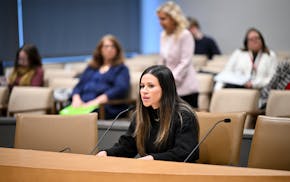The parents of five dead young women stood together and wept.
Justice had finally arrived, in some small capacity.
Derrick John Thompson was found guilty Friday on all counts — five of third-degree murder, 10 of criminal vehicular homicide — for killing Sabiriin Ali, Sahra Gesaade, Salma Abdikadir, Sagal Hersi and Siham Adam in a vicious car crash.
"All the mothers, the five of us, the five fathers, we feel relief right now," said Gesaade's mother, Fadumo Tingle. "We feel like it is off our shoulders, heaviness. ... We waited for justice and that for many, many years he won't be out."
The Hennepin County jury that heard the case delivered its verdict after two days of deliberations. The jurors also resolved that Thompson, 29, is deserving of a sentence above Minnesota state guidelines for his crimes.
It is the greatest reckoning he has faced for his decision two years ago to drive a rented Cadillac Escalade more than 110 miles per hour down Interstate 35W before taking an exit onto Lake Street, blowing through a red light and obliterating a Honda Civic.
The young women in the Civic were killed instantly.
They were all between 17 and 20. College students, or on their way. They were volunteers at their mosque and best friends. They had been preparing for a wedding the next day, getting henna tattoos at the Karmel Mall and running errands.
"I struggle to think of a case that meant more to me," said Assistant Hennepin County Attorney Paige Starkey. "This case has hit me in the heart, since the beginning."
Thompson's attorney, Tyler Bliss, declined to comment immediately after the verdict.
It had been a restless night for prosecutors and family members of the victims after the jury did not reach a verdict in the hours immediately after they were given the case on Thursday.
Lucas Sundelius, a 21-year-old University of Minnesota student, was one of the 12 jurors. He said it was a contentious deliberation, but a necessary one. "We had six people talking at the same time," Sundelius said. "But we were all bringing up good points."
Once the jury sat down with the evidence the little things, like the question of whether Thompson or a potential passenger was wearing a seatbelt, took on incredible weight.
"You're deciding the fate of another man's life," Sundelius said. "And you don't want to mess it up."
In the end, the prosecution team of Starkey, James Hanneman and Joe Paquette proved their case. They showed that Thompson rented the car, was in the driver's seat at the time of the crash and immediately ran from the scene.
During closing arguments Thursday, Starkey played police footage from the scene where Thompson complained about his Friday night being ruined.
"Derrick Thompson only cared about Derrick Thompson," she said.
Hennepin County Attorney Mary Moriarty said the state is hopeful Judge Carolina Lamas will give Thompson a sentence that reflects not only this crime but the fact that he was convicted in 2018 of fleeing police before a car crash that severely injured a woman in California. A gun and drugs were found in that car, as was the case with the Escalade in Minneapolis.
"These were choices," Moriarty said repeatedly. She added that the deaths of the five women would ripple through Minnesota for years to come.
Thompson will be sentenced July 24. He is still awaiting federal sentencing after a jury found him guilty of drug and weapon charges.
Proving third-degree murder
The verdict was vindication for the Hennepin County Attorney's Office, which had aggressively pursued accountability from Thompson since the crash sent shockwaves through Minnesota and devastated its Somali community in June 2023.
The immediate family members of the victims filled the courtroom Friday, as they had for the entire trial. When Lamas read the verdict a sigh of relief spread through the room, followed by muffled crying.
Thompson, the son of former Democratic state Rep. John Thompson, was brought into the courtroom by three Hennepin County sheriff's deputies. He stood stoically throughout and walked out quietly with his hands in his pockets.
As family members of the victims left the courtroom, many paused to hug Starkey.
The decision to stand trial was a calculated risk for Thompson. Last year, prosecutors offered him a deal: If he pleaded guilty to five counts of criminal vehicular manslaughter, he would be sentenced to between 32 and 38 years in prison. In Minnesota, he would have had the opportunity for supervised release after 21 to 25 years with good behavior.
Weeks later, the state amended the charges to include five counts of third-degree murder.
According to data from the Fourth Judicial District, there have only been three convictions for third-degree murder involving a car crash in Hennepin County in the last decade, and only once did the conviction come from a jury.
Bliss attempted to poke holes in the investigation throughout the trial — especially over the lack of a probe into what role Thompson's brother, Damarco, might have played in the crash.
Damarco provided the most dramatic moment of the trial, when he was compelled at the last minute to testify against his brother. Damarco told jurors he never drove the SUV that night and the last person he saw behind the wheel was Derrick.
Starkey said Friday that Bliss didn't file notice of his intention to say Damarco was the driver until a day before the trial. It forced the prosecution to quickly pivot. They subpoenaed Damarco, and Lamas compelled him to testify.
Following that testimony, Bliss said in his closing argument that even if Derrick was inside the car, his behavior was reckless but did not rise to the level of murder.
The jury disagreed.
Pain and support
The trial showcased intense video footage from the crash and its aftermath, and difficult testimony from family members of the five women who died.
The crash was a devastating but galvanizing moment for Minnesota and its Somali community. A fundraiser after the crash raised more than $450,000 for the victims' families.
Each day of the trial saw the courtroom filled with family and friends of the victims. An overflow courtroom was used, as well, and on Friday it immediately filled to capacity.
Most in the room were young women wearing hijabs.
Yacqub Mohamed, 22, of St. Paul said he didn't know the victims but wanted to attend to show support for the Somali community.
"It's good he's getting the justice he deserves," Mohamed said.
While the trial provided some closure over Thompson's role in the deaths, it also opened wounds.
In addition to the video of the crash, CT scans from autopsies of the young women's bodies were shown and an assistant medical examiner testified about the injuries caused by the crash.
Trying to counter that pain, prosecutors used the opportunity to bring Thompson's victims to life.
Over five days of witness testimony, a family member of each victim testified about who their loved ones had been. People in the gallery sobbed, passed tissues, bent their heads to their knees.
On Tuesday, the state called 20-year-old University of St. Thomas student Munir Abdikadir. Salma was his older sister by two years.
He told the court what his sister had planned for her life. A psychology major at St. Paul College and a natural storyteller, she wanted to become a therapist.
"She was very good with people," Munir said.
The night she died, his phone rang. He had just finished evening prayers. It was a friend calling who was known to be playful. He was talking about a crash and Munir thought it was a joke. He hung up. The same number called back, but the second time it was his friend's father on the line.
"I remember it was an adult talking," Munir said. "I knew it had to be serious."
He walked downstairs and told his mother, "Something has happened to Salma."
"I was trying to calm her down," Munir recalled. "My brothers were surrounding her."
He went upstairs to wake his father.
As the family drove toward Lake Street, they were searching for Salma using her shared iPhone location. They knew something was wrong.
When they arrived at the scene. Munir had to drag his mother out of the car. "I remember she kept falling on the floor."
His father stood in a corner and broke down.
"My parents are the strongest people I know," Munir said. "I didn't know what to do."
Later, after the family finished dawn prayer, he heard Salma had been taken to the medical examiner in Eden Prairie. Munir didn't want to go home, so he went there.
"My brain was telling me, 'She's still there, she's alive, there's no way she's dead.'"
He banged on the doors of the facility. Staff members came outside. He begged to be let in. They told him he couldn't see his sister. They tried to sympathize with him and calm him down.
The sun was rising as he went to leave and saw a meadow in the distance. He sat down in the grass and began talking to himself and to his sister.
"I never talked to myself this much," Munir said. "I remember asking myself questions. I was asking questions of my sister saying, 'Salma, Salma, where are you? I need you.' I remember saying, 'Where are you?'"
On the witness stand, he leaned forward and cried quietly.
His family, he told the jury, will never be the same.
Louis Krauss of the Minnesota Star Tribune contributed to this story.
U faculty and students fear budget cuts and tuition hikes will reduce staffing and enrollment

New report details how to improve MN's foster care system

Four arrested, no one injured in fighting and shooting following Burnsville High School graduation

One man dead in shooting Friday outside Northtown Mall in Blaine

